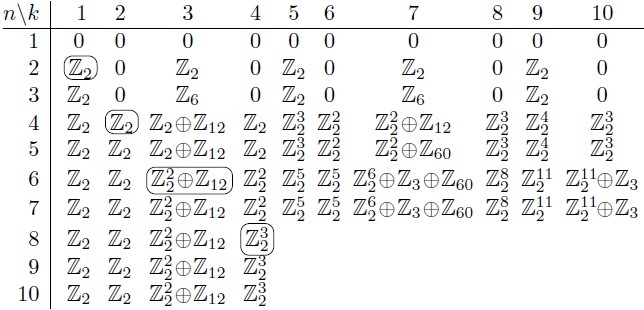The question concerns the group homology or group cohomology of symmetric groups.
- The entries in groupprops.subwiki.org and in this MO post show the results for the symmetric group S$_4$.
groupprops.subwiki.org, $H_q(\text{S}_4,\mathbb{Z})$:

this MO post, $H_k(\text{S}_{n=4},\mathbb{Z})$:

- If the groupprops.subwiki.org has the correct result, is it correct to say that the torsion parts of Group (Co)Homology of Symmetric Group are related by:
$$H^q(\text{S}_4,\mathbb{R}/\mathbb{Z})=H_q(\text{S}_4,\mathbb{Z})?$$
Thus, $$H^1(\text{S}_4,\mathbb{R}/\mathbb{Z})=H_1(\text{S}_4,\mathbb{Z})=\mathbb{Z}_2?$$ $$H^2(\text{S}_4,\mathbb{R}/\mathbb{Z})=H_2(\text{S}_4,\mathbb{Z})=\mathbb{Z}_2?$$ $$H^3(\text{S}_4,\mathbb{R}/\mathbb{Z})=H_3(\text{S}_4,\mathbb{Z})=\mathbb{Z}_2\oplus \mathbb{Z}_4\oplus \mathbb{Z}_3?$$ $$H^4(\text{S}_4,\mathbb{R}/\mathbb{Z})=H_4(\text{S}_4,\mathbb{Z})=\mathbb{Z}_2?$$
- More generally, do we have a precise relation between the group cohomology and group homology of different coefficients:
$$H^q(G,\mathbb{R}/\mathbb{Z}) \text { and } H_p(G,\mathbb{Z}),$$ say for any finite group $G$, and here in particular $\text{S}_4$? (Here $\mathbb{R}/\mathbb{Z}=S^1=$U(1).)
